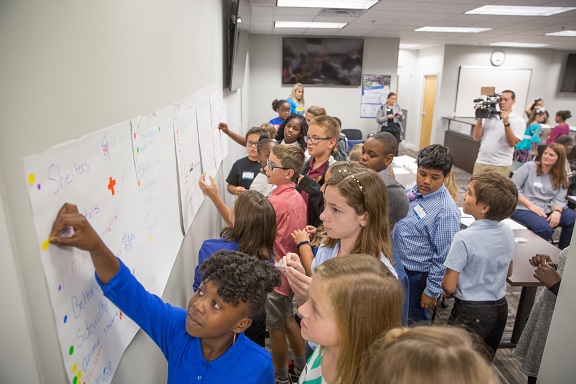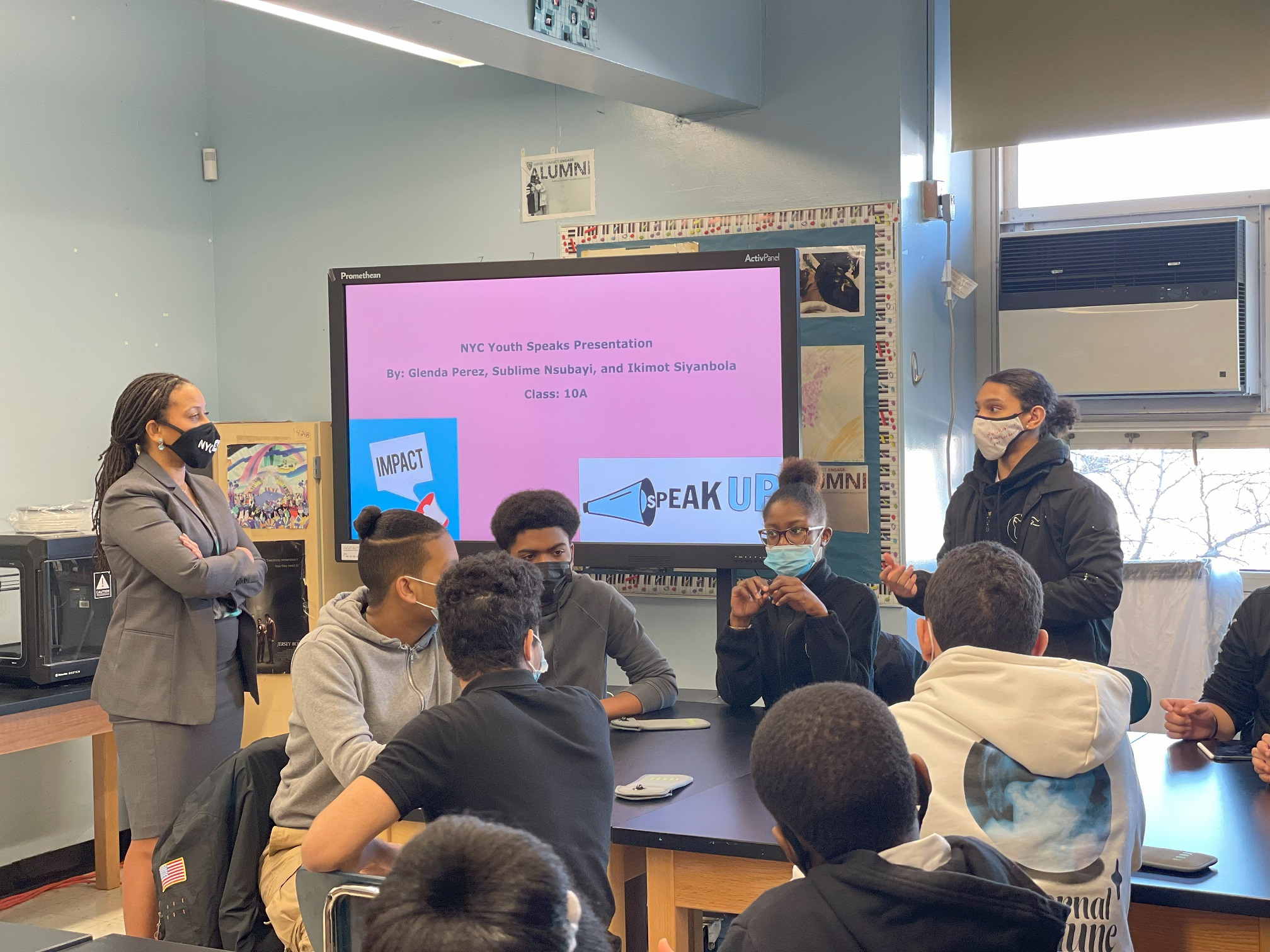By Mike McGrath
Last summer, Ciara Barber, an eight-year-old Massachusetts girl, participated in a unique experiment in civic learning. As part of her “Town Hall Project,” she vowed to visit every town and city hall in the commonwealth. After word of Ciara’s journey started to spread around the commonwealth via the media, local officials began rolling out the red carpet in preparation for her visit.
In Westfield, Massachusetts, for example, she was proclaimed “Westfield Mayor for the Day.”
A police cruiser and a fire truck greeted her when she arrived at the Danvers, Massachusetts, Town hall, where she toured the building and met with Mayor Steve Bartha and Assistant City Manager Jen Breaker.
 Breaker later told the Salem News that Ciara’s visit was the highlight of her summer. “Her excitement about being here is awesome,” she said, “and it’s great to have the opportunity to show her a little bit of behind the scenes, which we don’t often get to do.”
Breaker later told the Salem News that Ciara’s visit was the highlight of her summer. “Her excitement about being here is awesome,” she said, “and it’s great to have the opportunity to show her a little bit of behind the scenes, which we don’t often get to do.”
Localities have certain advantages when it comes to experiential civic learning. As Jan Brennan noted in the summer 2022 issue of the National Civic Review, “Local government, civic and nonprofit organizations are well positioned to partner in providing engaged, applied civic learning opportunities for youth. Local issues have greater relevance to young people and are more easily connected to their personal experiences. There is also greater opportunity for youth to have meaningful impact on civic issues at a local level.”
Many communities have established youth commissions or youth councils to engage younger members of the community in conversations and common projects with local officials and community organizations. Often these entities combine civic learning with experiences that can foster leadership skills and enhance social networks for youth. We learned of some of these efforts last June during the annual All-America City Award jury presentations.
The theme of the 2023 All-America City Award was “creating thriving communities through youth engagement,” so projects highlighted by the finalist communities revealed numerous examples of residents, nonprofits, businesses, and government leaders, creating opportunities for young people to engage in their communities and learn more about civic life and public decision-making.
Rebecca Trout describes some of these examples in her article on the award winners in this issue of the National Civic Review. In Dallas, Texas, for example, the local youth commission held a Teen Town Hall, where young people came together to discuss the issues that were important to them. Local officials were there to answer questions about issues such as policing and voter registration. The Gonzales California Youth Council chose mental health as one of the issues of concern, and the result was an informational video and a clinical licensed social worker hired for one of the local schools.
In this article, I point to some of the other youth engagement and civic learning efforts presented by the 2023 finalist communities.
New York City’s Civic Engagement Commission organized a participatory budgeting process designed by young people. The participants were given the opportunity to make decisions on how to spend $100,000 on projects that they perceived as meeting their needs. The project began during the early months of the COVID pandemic, so a group of Youth Fellows served as moderators on a digital platform, developing messaging and promoting the process on social media. They facilitated thirty-two conversations engaging more than two hundred members of the community. Youth-serving organizations were asked to submit proposals on how to spend the money, and five projects were selected and funded with $20,000 each.
In Gardena, California, the city created programs designed to “instill civic engagement, inclusiveness, equity, collaboration, and innovation to create a shared vision” for the community. Gardena holds a Youth Government Day in partnership with local community organizations and schools. More than 75 students participated in the event, which included breakfast with the city council, team building, and tours of city departments. The participants were asked to work on a project in which they identified a community need and presented ideas for practical solutions.
 Port St. Lucie, Florida, which was originally founded as a retirement community, held a “Florida City Government Week,” working with the Florida League of Cities to engage young people in an event that showcased the work of municipalities. City staff and council members visited local schools and hosted five youth assemblies, engaging more than one thousand students in discussions of local government operations, forms of engagement, and the importance of voting.
Port St. Lucie, Florida, which was originally founded as a retirement community, held a “Florida City Government Week,” working with the Florida League of Cities to engage young people in an event that showcased the work of municipalities. City staff and council members visited local schools and hosted five youth assemblies, engaging more than one thousand students in discussions of local government operations, forms of engagement, and the importance of voting.
 The mayor’s office in Saginaw, Texas, created a Mayor’s Youth Advisory Council in 2018 to increase youth involvement in local affairs. The council holds a five-month session for high school students to educate them about the functions of government and get their input on community issues. A committee of juniors and seniors selected by city staff and local educators meets once a month to learn about city government and provide input. Participants are asked to pick a topic and come up with recommendations for the city council.
The mayor’s office in Saginaw, Texas, created a Mayor’s Youth Advisory Council in 2018 to increase youth involvement in local affairs. The council holds a five-month session for high school students to educate them about the functions of government and get their input on community issues. A committee of juniors and seniors selected by city staff and local educators meets once a month to learn about city government and provide input. Participants are asked to pick a topic and come up with recommendations for the city council.
 The Village of Wellington Florida offers a Civics 101 course for middle and high school students. Participants meet with local elected officials and city staff in question-and-answer sessions. Later, they are divided into several groups and are assigned projects to present in “mock city council meetings” for council approval.
The Village of Wellington Florida offers a Civics 101 course for middle and high school students. Participants meet with local elected officials and city staff in question-and-answer sessions. Later, they are divided into several groups and are assigned projects to present in “mock city council meetings” for council approval.
These are just a few examples of what local governments and nonprofits are doing to educate young people by giving them practical experience with the realities of public administration, policymaking, and planning. Other examples can be found on the National Civic League Promising Practices web page. In 2017, for example, the Phoenix Union High School District held a district-wide participatory budgeting processes, giving local youth a chance to learn “democracy by doing.”
They say that familiarity breeds contempt, but in my experience, familiarity with public institutions breeds a more sympathetic and realistic understanding of how they work. Parents who regularly volunteer in PTAs and PTOs, for example, usually know more about school systems and the challenges facing educators than the angry mobs that only show up at public meetings when the latest controversy or single-issue crusade goes viral on social media.
Which is not to say that familiarity fosters (or should foster) an uncritical attitude toward public officials and public agencies. Ideally, it encourages people to hold decision-makers accountable and to demand higher levels of performance and improvement, while also providing the public with a better understanding of the challenges, trade-offs, and available resources associated with any important public decision.
The last time the National Assessment of Educational Progress released their report card on civics learning, the news was not good. “In 2022, twenty-two percent of eighth-grade students performed at or above the NAEP Proficient level on the civics assessment. The percentage of eighth-grade students performing at or above the NAEP Proficient level in 2022 was not significantly different compared to either the previous assessment in 2018 or to 1998, the first assessment year.” Not “significantly different,” perhaps, but there was a three percent decline in 2022, which is not a good sign.
Educators and civil society leaders have been warning about a “crisis of civics education” for years. Many students are unable to answer basic questions about U.S. government and American history. Civic education advocates often note that fewer high schools offer “civics” classes as a requirement for graduating.
Rote knowledge of the Constitution and how a bill becomes law—these things are obviously very important—but civic learning can take on many forms, as demonstrated by the 2023 All-America City finalists.
Mike McGrath is Editor of the National Civic Review.




